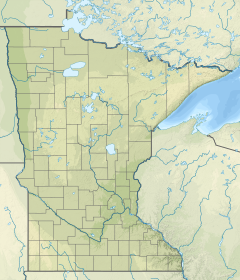Whitewater River (Minnesota)
| Whitewater River | |
|---|---|
 The Whitewater River in Whitewater State Park | |
| Location | |
| Country | United States |
| State | Minnesota |
| County | Wabasha, Olmsted, Winona |
| Physical characteristics | |
| Source | |
| • location | Elba, Minnesota |
| • coordinates | 44°05′05″N 92°01′19″W / 44.0846859°N 92.0218277°W |
| Mouth | |
• location | Weaver, Minnesota |
• coordinates | 44°12′33″N 91°54′12″W / 44.2091°N 91.9032°W |
| Length | 16.6 mi (26.7 km) |
| Discharge | |
| • location | Beaver, Minnesota |
| • average | 133 cu/ft. per sec |
| Basin features | |
| River system | Upper Mississippi River |
| Tributaries | |
| • left | Beaver Creek, North Fork Whitewater River[1] |
| • right | Middle Fork Whitewater River, South Fork Whitewater River, Trout Valley Creek[1] |
The Whitewater River is a 16.6-mile-long (26.7 km)[2] tributary of the Upper Mississippi River which flows through the Driftless Area of Minnesota, reaching its mouth in Wabasha County at the community of Weaver opposite Buffalo, Wisconsin. The nearest towns are Altura, Saint Charles, and Elba. The region hosts endangered native dry oak savannas, semiforested areas that seem to have been dependent on fire for their well-being.[3][4]
The main stem of the Whitewater River is formed by the confluence of the North Fork Whitewater River and Middle Fork Whitewater River at Elba, and is joined by the South Fork Whitewater River, just downstream. The North Fork flows through Wabasha, Olmsted, and Winona counties, with a "channel length of 47 km"[5] (c. 30 miles). The upper branches of the Whitewater River system including the portion that flows through Whitewater State Park are designated trout streams.[6] Native brook, wild brown and occasionally stocked rainbow trout populate the streams.
The state maintains Whitewater State Park on the upper reach of the main stem, on the Middle Fork and on Trout Run Creek. Crystal Springs Fish Hatchery is located on the lower portion of the South Fork.[7]
Whitewater River is the English translation of the native Sioux language name.[8]
At Beaver, Minnesota, the river had an average discharge of 133 cubic feet per second between 1940 and 1957.[9]
Conservation and restoration
In the 1990s the Minnesota Department of Natural Resources restored nearly 5 miles (8 km) of the river (including a straight channel dug in the 1950s) to a more natural, meandering form. Designed to allow the river to access its floodplain, the restored section is supposed to disperse high water levels over a relatively wide area and reduce shoreline erosion.[10]
Floods
The year 1938 saw major flooding and sediment deposition along the river.[10]
As a result of the 2007 Midwest flooding, the river overtopped its dikes, flooding the town of Elba on August 18, 2007.[11]
References
- ^ a b "Southern Minnesota Maps". Minnesota Department of Natural Resources. Retrieved March 28, 2021.
- ^ U.S. Geological Survey. National Hydrography Dataset high-resolution flowline data. The National Map, accessed October 4, 2012
- ^ 1993 Proceedings of the Midwest Oak Savanna Conferences", United States Environmental Protection Agency, Retrieved July 12, 2007
- ^ U.S. Geological Survey Geographic Names Information System: Whitewater River, Retrieved July 12, 2007
- ^ Mast, M.A., and Turk, J.T., 1999, "North Fork Whitewater River: Environmental characteristics and water quality of Hydrologic Benchmark Network stations in the Midwestern United States, 1963-95", U.S. Geological Survey Circular 1173-B, Retrieved July 12, 2007
- ^ "Whitewater River State Water Trail - Minnesota DNR - MN Department of Natural Resources". www.dnr.state.mn.us. Retrieved 2019-01-17.
- ^ Basin Alliance for the Lower Mississippi in Minnesota, February 4, 2004, Retrieved July 12, 2007
- ^ Upham, Warren (1920). Minnesota Geographic Names: Their Origin and Historic Significance. Minnesota Historical Society. p. 389.
- ^ "Search". USGS.
- ^ a b Kallok, Michael A. Minnesota Conservation Volunteer (March–April 2008). Minnesota Department of Natural Resources. 74-75.
- ^ Steil, Mark (2007-08-22). "The town of Elba mucks out". Minnesota Public Radio. Retrieved 2007-08-24.
- Waters, Thomas F. (1977). Streams and Rivers of Minnesota. Minneapolis: University Of Minnesota Press. pp. 259–262. ISBN 0816609608.
External links
- "Whitewater River Watershed Project". White Water Watershed. Retrieved July 12, 2007.
- "Southeast Minnesota Trout Streams Map" (PDF). Minnesota Department of Natural Resources. Retrieved July 12, 2007. (771 KiB)

